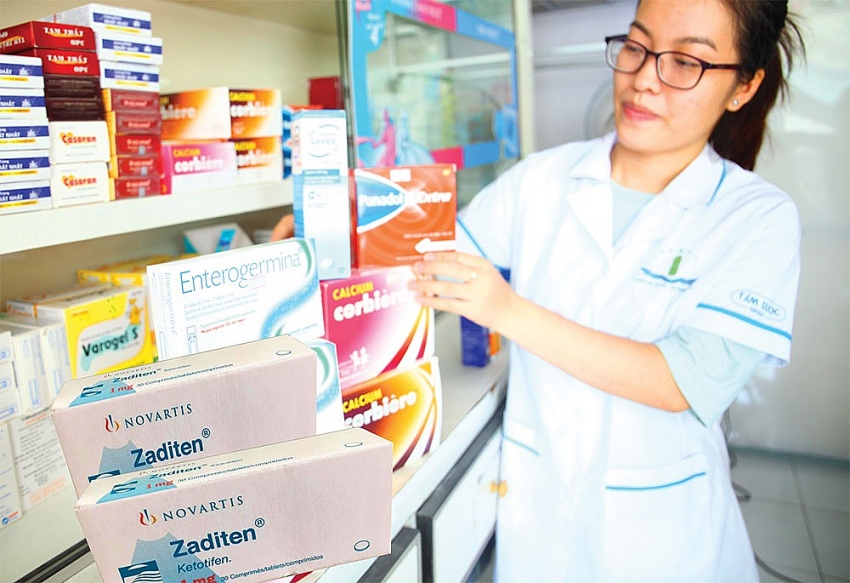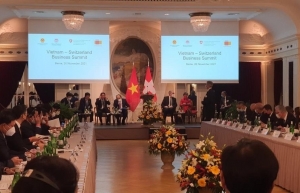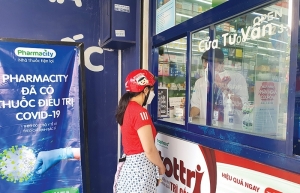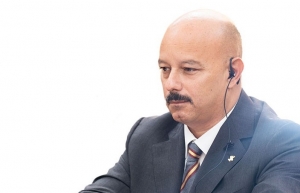MNCs pivot to innovative medicines
Swiss-based drug giant Novartis in August announced its plan to completely spin off its generics and biosimilars division Sandoz in 2023 to create a new publicly-traded standalone firm.
 |
| By separating generic and biosimilar divisions, multinationals can concentrate on other areas, Le Toan |
For Novartis, separating from Sandoz will further strengthen its strategy of building a focused innovative medicines company, with depth in five core therapeutic areas and strength in technology platforms. Last year, Sandoz generated sales worth $9.6 billion and served more than 100 markets across the globe.
Novartis and Sandoz are developing well in Vietnam, providing branded pharmaceuticals, generics, and biosimilars amid growing local demand. Novartis is intensifying cooperation with the Ministry of Health (MoH) and public-run hospitals to increase the supply of innovative pharmaceuticals for local patients. Last week, Novartis Vietnam signed an MoU with K Hospital on cancer treatment.
Vietnam is considered as one of the fastest-growing markets in Asia for Sandoz, with the firm growing its team to 180 employees and attaining consistent double-digit growth.
The trend of separating a generics division among multination corporations (MNCs) is increasingly popular. Viatris previously separated from US-based Pfizer to become a standalone company focusing on branded-generic drugs, while Pfizer focuses on innovative drugs.
In July, Viatris Vietnam opened a new office in Hanoi, marking it the second facility following the first in Ho Chi Minh City last year.
Talking to VIR, a representative of Viatris said that the company is developing well and expects growth in the future, driven by growing demands and supporting policies from the government. “We plan to provide more high-quality branded generics and off-patent originators, as well as focusing on localisation efforts through technology transfer as a way to contribute to the development of the local health sector,” the representative said.
Elsewhere, Merck, known as MSD outside the United States and Canada, completed the spinoff of Organon in 2021 to boost its focus on growth areas. As a separate company, Organon now focuses on enhancing women’s health and currently has a portfolio of about 60 treatments and products.
The move is part of MSD’s strategy to establish two patient-focused companies with an improved operational focus, streamlined operating models, enhanced capital structures, and financial profiles. A representative of MSD said that with leadership in growth pillars and a robust pipeline, Merck is well-positioned for strong long-term growth, with scientific innovation remaining the source of its value creation.
Meanwhile, British drugs giant GlaxoSmithKline (GSK) in July demerged its newly-named consumer healthcare unit Haleon. As a standalone company, Haleon aims to be a world leader in consumer health with a portfolio of top brands including Sensodyne, Voltaren, Panadol, and Centrum.
GSK is also expanding further into the field of vaccines, having snapped up US biopharmaceutical firm Affinivax in May for up to $3.3 billion. Also this year, it spent $1.9 billion on US group Sierra Oncology, a specialist in medicines for rare forms of cancer.
Vietnam’s government targets to develop the local pharma industry, with the goal of making Vietnam a life and science hub for ASEAN in the next 10 years. Last year the government issued Decision No.376/QD-TTG approving the programme to develop the pharmaceutical industry until 2030, with a strong focus on local manufacturing and technology transfer.
A more holistic national strategy for the development of the pharmaceutical industry vision for 2045 is being drafted, which is expected to be the foundation for pharma-policy development and investment incentives in the future.
Despite growth potential, the path for MNCs remains tough due to some legal barriers in the healthcare sector. For instance, controversial rules on marketing authorisation (MA) renewal are causing difficulties for MNCs and the healthcare sector itself, which is suffering from a lack of drugs. Under existing rules, pharmaceuticals and ingredients must get MA from the MoH before being used in treatment or pharma production activities in Vietnam. The first MA provides a product with a registration number and validity of 3-5 years. After that, it will then have to be renewed for further use. Many MNCs want this regulation, which is deemed not in alignment with international practices, to be revised.
The other threat to foreign-invested enterprises with branded and high-quality generic drugs is that local drugmakers are proposing that health authorities change tender rules for groups of generic drugs – which may include branded and high-quality as well as locally-made drugs – into one group for tender. If this happens, such enterprises will face more challenges because generic drugs would be equated the same in quality and price.
 | Novartis and Ministry of Health sign MoU on portfolio of affordable COVID-19 medicines At the Switzerland-Vietnam Business Summit in Bern, Switzerland, Novartis and Vietnam’s Ministry of Health have signed an MoU to provide affordable medicines without a profit margin for the treatment of severe COVID-19 symptoms that help stabilise critically ill patients during the pandemic. |
 | Answers around corner for market authorisation renewal A steady supply of medicines coming into Vietnam could be ensured imminently after the government announced the deadline for amendments to existing drug registration rules in order to facilitate business operations. |
 | AstraZeneca to increase early patient access to new medicines in Vietnam Last week marked an important step in AstraZeneca’s journey in Vietnam. On his visit to Hanoi, Dr. John L. Perez, senior vice president of the Vaccines and Immune Therapies Unit at AstraZeneca, talked to VIR’s Bich Thuy about the company’s future ambition and ongoing efforts to increase Vietnamese patients’ early access to new medicines. |
What the stars mean:
★ Poor ★ ★ Promising ★★★ Good ★★★★ Very good ★★★★★ Exceptional
Related Contents
Latest News
More News
- Masan Consumer names new deputy CEO to drive foods and beverages growth (February 23, 2026 | 20:52)
- Myriad risks ahead, but ones Vietnam can confront (February 20, 2026 | 15:02)
- Vietnam making the leap into AI and semiconductors (February 20, 2026 | 09:37)
- Funding must be activated for semiconductor success (February 20, 2026 | 09:20)
- Resilience as new benchmark for smarter infrastructure (February 19, 2026 | 20:35)
- A golden time to shine within ASEAN (February 19, 2026 | 20:22)
- Vietnam’s pivotal year for advancing sustainability (February 19, 2026 | 08:44)
- Strengthening the core role of industry and trade (February 19, 2026 | 08:35)
- Future orientations for healthcare improvements (February 19, 2026 | 08:29)
- Infrastructure orientations suitable for a new chapter (February 19, 2026 | 08:15)

 Tag:
Tag:

















 Mobile Version
Mobile Version